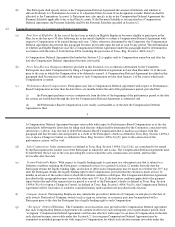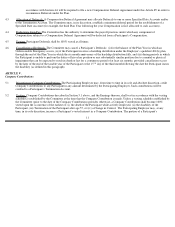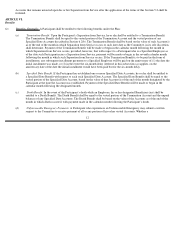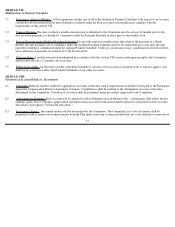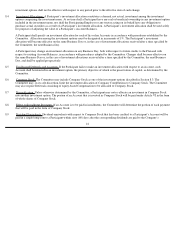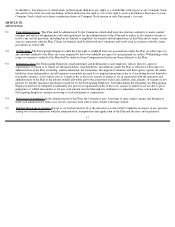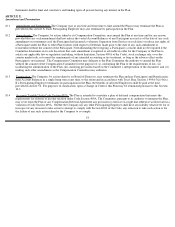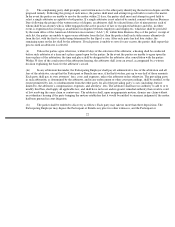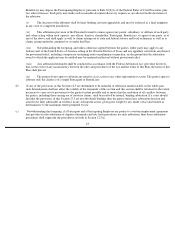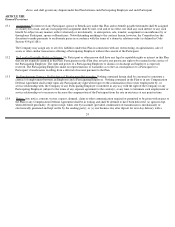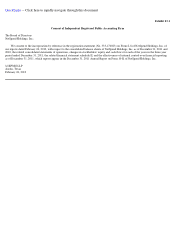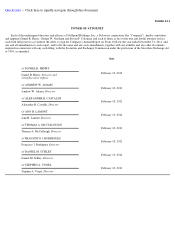NetSpend 2011 Annual Report Download - page 154
Download and view the complete annual report
Please find page 154 of the 2011 NetSpend annual report below. You can navigate through the pages in the report by either clicking on the pages listed below, or by using the keyword search tool below to find specific information within the annual report.
ARTICLE XI.
Informal Funding
11.1
General Assets; Unsecured Obligation. The obligations of the Participating Employers under the Plan shall be unfunded and
unsecured for ERISA and Code purposes, and nothing contained herein shall be construed as providing for assets to be held in trust or
escrow or any other form of segregation of the assets of a Participating Employer for the benefit of any Participant or any other person
or persons to whom benefits are to be paid pursuant to the terms of the Plan. To the extent that a Participant or any other person
acquires a right to receive benefits under the Plan, such rights shall be no greater than the right of an unsecured general creditor of the
Participating Employer that employs such Participant. Nothing contained in this Plan, and no action taken pursuant to its provisions,
shall create or be construed to create a trust of any kind, or a fiduciary relationship, between the Participating Employers and any
Employee, spouse, or Beneficiary.
11.2
Obligations of Each Participating Employer . Each Participating Employer shall be obligated to make payments under the Plan with
respect to the portion of a Participant’s Account attributable to Deferrals and Company Contributions credited while the Participant
was employed by such Participating Employer and any amounts credited or debited to such portion of the Participant’s Account under
Section 8.2 hereof, and shall not be obligated with respect to any remaining portion of the Participant’s Account. In the event that
more than one Participating Employer is obligated under the Plan with respect to a Participant’s Account, the Participant’s Account
shall include subaccounts, which shall be credited or debited with the amounts attributable to the obligations of each such Participating
Employer. For purposes of clarification, no Participating Employer shall be obligated to make payments under the Plan with respect
to a Participant that has not been employed by such Participating Employer.
11.3
Rabbi Trust
. One or more Participating Employers may, in their sole discretion, establish a grantor trust, commonly known as a rabbi
trust, as a vehicle for accumulating assets to pay benefits under the Plan. Payments under the Plan may be paid from the general assets
of the Participating Employer or from the assets of any such rabbi trust that are allocable to such Participating Employer. Payment
from any such source shall reduce the obligation owed to the Participant or Beneficiary under the Plan. For the avoidance of doubt,
any assets accumulated in a rabbi trust by a Participating Employer will remain subject to the rights of the general creditors of such
Participating Employer.
ARTICLE XII.
Claims
12.1
Filing a Claim.
Any controversy or claim arising out of or relating to the Plan shall be filed in writing with the Committee which shall
make all determinations concerning such
19
claim. Any claim filed with the Committee and any decision by the Committee denying such claim shall be in writing and shall be
delivered to the Participant or Beneficiary filing the claim (the “Claimant”).
(a)
In General. Notice of a denial of benefits will be provided within 90 days of the Committee’s receipt of the Claimant’
s claim
for benefits. If the Committee determines that it needs additional time to review the claim, the Committee will provide the
Claimant with a notice of the extension before the end of the initial 90-day period. The extension will not be more than 90
days from the end of the initial 90-day period and the notice of extension will explain the special circumstances that require
the extension and the date by which the Committee expects to make a decision.
(b)
Contents of Notice.
If a claim for benefits is completely or partially denied, notice of such denial shall be in writing and shall
set forth the reasons for denial in plain language. The notice shall: (i) cite the pertinent provisions of the Plan document, and
(ii) explain, where appropriate, how the Claimant can perfect the claim, including a description of any additional material or
information necessary to complete the claim and why such material or information is necessary. The claim denial also shall
include an explanation of the claims review procedures and the time limits applicable to such procedures, including a
statement of the Claimant’s right to bring a civil action under Section 502(a) of ERISA following an adverse decision on
review.
12.2
Appeal of Denied Claims .
(a)
A Claimant whose claim has been completely or partially denied shall be entitled to appeal the claim denial by filing a
written appeal with a committee designated to hear such appeals (the “Appeals Committee”). A Claimant who timely
requests a review of the denied claim (or his or her authorized representative) may review, upon request and free of charge,
copies of all documents, records and other information relevant to the denial and may submit written comments, documents,
records and other information relevant to the claim to the Appeals Committee. All written comments, documents, records,
and other information shall be considered “relevant” if the information: (i) was relied upon in making a benefits
determination, (ii) was submitted, considered or generated in the course of making a benefits decision regardless of whether it
was relied upon to make the decision, or (iii) demonstrates compliance with administrative processes and safeguards
established for making benefit decisions. The Appeals Committee may, in its sole discretion and if it deems appropriate or
necessary, decide to hold a hearing with respect to the claim appeal.


